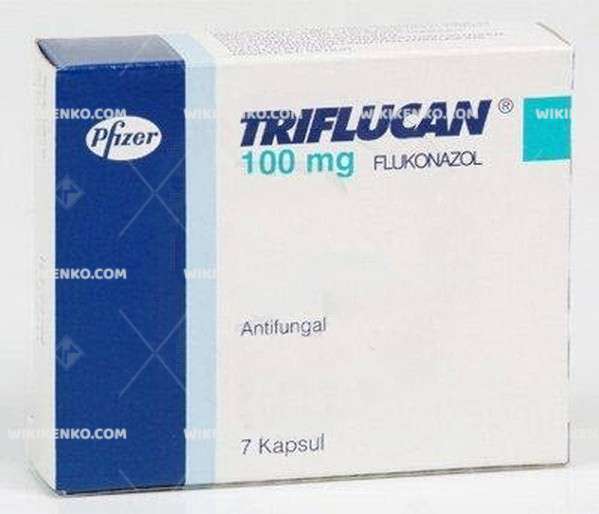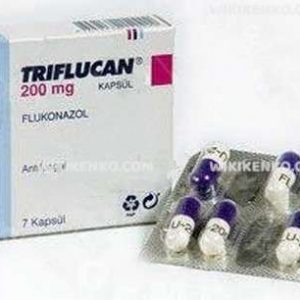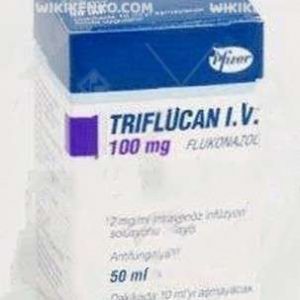Triflucan Capsule 100 Mg (7 Capsule)
Let’s delve into the world of Triflucan Capsule 100 Mg, a powerful antifungal medication that has proven to be a game-changer in the treatment of various fungal infections. In this comprehensive overview, we’ll explore the uses, dosage, side effects, and other essential information about this versatile pharmaceutical.
| Dosage form | |
|---|---|
| Pack size | |
| Potency | 100 Mg (7 Capsule) |
| Manufacturer | |
| Origin | |
| Generic Name (Ingredient) | Fluconazole 100 Mg |
Assuming your emergency circumstances for this product, visit Urgent Quotation page. Besides, for any pharmaceutical questions, please ask us in the comments section.
Description
Uses of Triflucan Capsule 100 Mg
Triflucan Capsule 100 Mg, containing the active ingredient fluconazole, is a highly effective antifungal medication used to treat a wide range of fungal infections. Some of the key applications of this medication include:
Fungal Corneal Ulcers/Keratitis
Triflucan has demonstrated its efficacy in the treatment of fungal corneal ulcers and keratitis, conditions that can lead to vision impairment if left untreated.
Candida Infections
Triflucan is a go-to treatment for various Candida-related infections, such as Candida intertrigo, Candida pneumonia, Candida urinary tract infections, Candidemia, and Esophageal Candidiasis.
Coccidioidomycosis
This medication is also used to manage coccidioidomycosis, a fungal infection caused by the Coccidioides species.
Cryptococcal Meningitis
Triflucan is a crucial component in the treatment of cryptococcal meningitis, a life-threatening fungal infection of the central nervous system, particularly in individuals with compromised immune systems.
Other Fungal Infections
Triflucan is also effective in treating a variety of other fungal infections, including Fungal peritonitis caused by Candida, Oropharyngeal Candidiasis, Peritoneal candidiasis, Pneumonia cryptococcal, and Disseminated Candidiasis.
How Triflucan Works
Triflucan, or fluconazole, exerts its antifungal activity through a unique mechanism of action. It selectively inhibits the fungal cytochrome P450-dependent enzyme lanosterol 14-α-demethylase, which is crucial for the synthesis of ergosterol, a vital component of the fungal cell wall.
Disrupting Ergosterol Synthesis
By binding to the heme group of lanosterol 14-α-demethylase, Triflucan prevents the activation of oxygen and inhibits the demethylation of lanosterol. This disruption in the ergosterol biosynthesis pathway leads to the accumulation of methylated sterols in the fungal cellular membrane, ultimately arresting fungal growth and treating the infection.
Dosage and Administration
The recommended dosage of Triflucan Capsule 100 Mg varies depending on the specific fungal infection being treated. It is essential to follow the healthcare provider’s instructions regarding the appropriate dosage and duration of treatment.
Oral Administration
Triflucan capsules should be taken orally with water, as directed by your healthcare provider.
Dosage Considerations
The dosage may be adjusted based on factors such as the severity of the infection, the patient’s response to treatment, and the presence of any underlying medical conditions.
Side Effects
While Triflucan is generally well-tolerated, like any medication, it may cause some side effects. It’s important to be aware of these potential side effects and report any unusual symptoms to your healthcare provider.
Common Side Effects
The most commonly reported side effects of Triflucan include nausea, headache, and abdominal discomfort.
Serious Side Effects
Serious side effects, though rare, may include liver dysfunction and allergic reactions. Patients should seek immediate medical attention if they experience any concerning symptoms.
Precautions
Before starting Triflucan, it’s crucial to inform your healthcare provider about any existing medical conditions or medications you are currently taking. This information will help your doctor assess the potential risks and benefits of using Triflucan.
Drug Interactions
Triflucan may interact with certain medications, so it’s essential to discuss potential interactions with your doctor. Some drugs that may interact with Triflucan include cisapride, erythromycin, pimozide, quinidine, and astemizole.
Special Populations
Pregnant or breastfeeding individuals should consult their healthcare provider before using Triflucan, as the potential risks and benefits must be carefully weighed.
Storage and Availability
Triflucan Capsule 100 Mg should be stored in a cool, dry place away from direct sunlight. It is available by prescription only and can be obtained from your local pharmacy.
Generic Names
Fluconazole is the generic name for Triflucan, and it is also known by other brand names such as Diflucan, Difluconazole, Fluconazol, Fluconazole, and Fluconazolum.
Conclusion
Triflucan Capsule 100 Mg is a versatile and highly effective antifungal medication that has proven to be a valuable tool in the treatment of a wide range of fungal infections. By understanding its uses, mechanism of action, dosage, and potential side effects, healthcare providers can make informed decisions and provide their patients with the best possible care.
We encourage you to always consult your healthcare provider for personalized advice and to report any adverse effects promptly.
Triflucan offers hope and relief for those battling fungal infections, and with proper use, it can promote healing and improve the quality of life for those affected.
Table: Key Information about Triflucan Capsule 100 Mg
| Category | Details |
|---|---|
| Side Effects | – Common: Nausea, headache, abdominal discomfort – Serious (rare): Liver dysfunction, allergic reactions |
| Dosage | – Varies based on the specific infection – Follow healthcare provider’s instructions |
| Benefits | – Effective treatment for a wide range of fungal infections – Helps manage conditions like fungal corneal ulcers, Candida infections, coccidioidomycosis, and cryptococcal meningitis |
| Usage | – Take capsules orally with water – Do not break, chew, or crush the capsules |
| Precautions | – Inform healthcare provider about existing medical conditions and medications – Potential drug interactions, especially with certain medications – Consult healthcare provider if pregnant or breastfeeding |
Use the form below to report an error
Please answer the questions as thoroughly and accurately as possible. Your answers will help us better understand what kind of mistakes happen, why and where they happen, and in the end the purpose is to build a better archive to guide researchers and professionals around the world.
The information on this page is not intended to be a substitute for professional medical advice, diagnosis, or treatment. always seek the advice for your physician or another qualified health provider with any questions you may have regarding a medical condition. Always remember to
- Ask your own doctor for medical advice.
- Names, brands, and dosage may differ between countries.
- When not feeling well, or experiencing side effects always contact your own doctor.
Cyberchondria
The truth is that when we’re sick, or worried about getting sick, the internet won’t help.
According to Wikipedia, cyberchondria is a mental disorder consisting in the desire to independently make a diagnosis based on the symptoms of diseases described on Internet sites.
Why you can't look for symptoms on the Internet
If diagnoses could be made simply from a textbook or an article on a website, we would all be doctors and treat ourselves. Nothing can replace the experience and knowledge of specially trained people. As in any field, in medicine there are unscrupulous specialists, differences of opinion, inaccurate diagnoses and incorrect test results.






Reviews
There are no reviews yet.